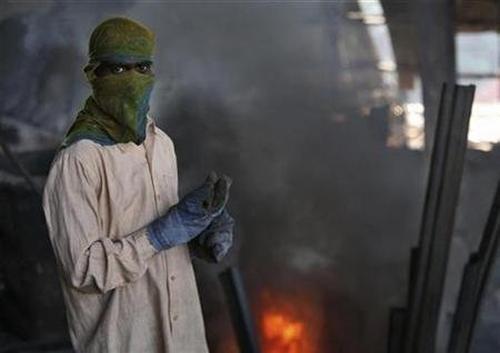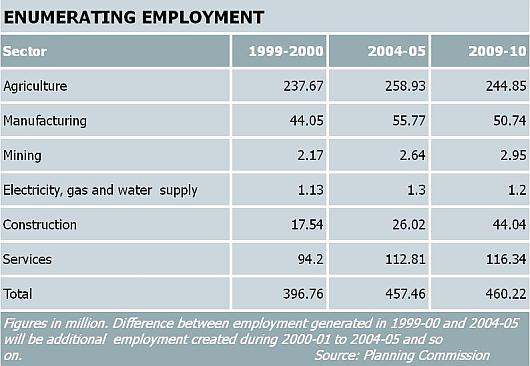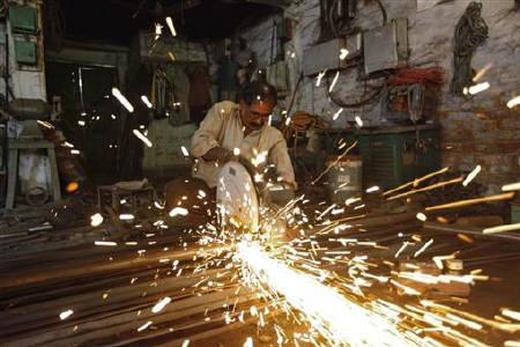
Employment generation during the five-year period till 2009-10 grew at a snail's pace and the biggest hope, manufacturing, saw job losses, says official document.
The trend in manufacturing needs to be reversed, since 183 million jobseekers are expected to join the workforce over the next 15 years, it says.
According to the 12th Five-Year Plan (2012-13 to 2016-17) document, employment in manufacturing reduced by five million during 2005-06 to 2009-10, after adding almost 12 million jobs in the first five years of this century.
"The net increase in employment over the decade 2000-01 to 2009-10 was around six million, a 13 per cent increase over 10 years," the document said.
Even after the global financial crisis of 2008-09, the period from 2005-06 to 2009-10 delivered average yearly GDP growth of 8.7 per cent, much higher than the 5.78 per cent in the preceding five years.
The document says manufacturing in India contributes only 11 per cent of all jobs. In other emerging economies, the share of employment in manufacturing is 15-30 per cent.
Ta-Ta, Ratan: Tribute to an iconic Indian
...

The data further showed that though there was a dip in employment in the sector during 2005-06 to 2009-10, overall across all sectors, the number of jobs grew from 457.46 million to 460.22 million. This growth largely came from mining, construction and services.
Construction generated the highest number of additional jobs, while services (sans construction) remained the highest employment provider after agriculture. During 2005-06 to 2009-10, construction created 18.02 million jobs, while it gave employment to an additional 8.48 million during 2000-01 to 2004-05.
The data further showed that in services (without construction), 18.02 million jobs were generated during 2000-01 to 2004-05, while 3.53 million were created during 2005-06 to 2009-10.
According to a sample survey by the Labour Bureau, Shimla, seven labour-intensive industries (which includes some services) - mining, textiles, metals, gems & jewellery, automobiles, transport and information technology and business process outsourcing - saw a job loss of 500,000 people in the third quarter of 2008-09, the worst three months due to the global financial crisis. These sectors contributed 60 per cent to India's GDP in 2007-08.
According to the Plan document, apart from manufacturing, agriculture was the sector where people lost employment, in fact more than in factory activities. While 2000-01 to 2004-05 saw agriculture creating 21.26 million jobs, the next five years witnessed a decline by 14.08 million.
Ta-Ta, Ratan: Tribute to an iconic Indian
...

However, it should be noted that much of the employment in the farm sector is disguised unemployment. As such, it is considered a positive development if people shift from pure agriculture to other sectors of economic activity.
The panel in its draft document said 183 million additional income-seekers are expected to join the workforce over the next 15 years and agriculture alone cannot be expected to provide jobs.
"Unless manufacturing becomes the engine of growth, providing at least 70 million additional jobs, it will be difficult for India's growth to be inclusive. As the pattern of development of the manufacturing sector has not delivered the desired growth in output and employment, a change in strategy is needed," the document added.
A discussion paper from the department of industrial policy and promotion on the importance of National Manufacturing and Investment Zones (NMIZs) says over the next decade, India has to create gainful job opportunities for a large section of its population, with varying degrees of skills and qualifications.
"The manufacturing sector would have to be the bulwark of this employment creation initiative," it added.
As such, the successful execution of NMIZs will go a long way in not only increasing the share of manufacturing in India's GDP from the current 15 per cent to 25 per cent over a decade but in adding jobs.